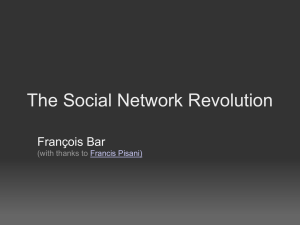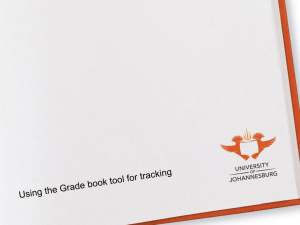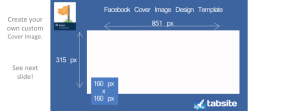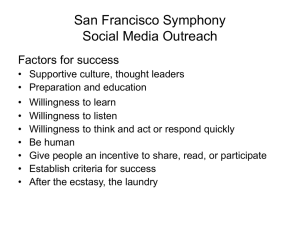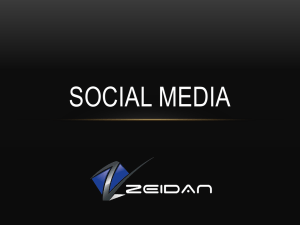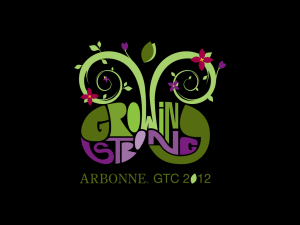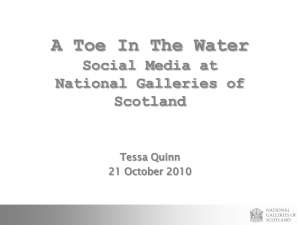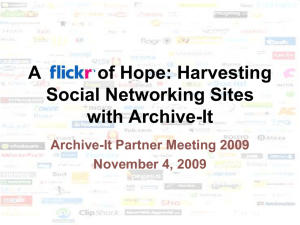The_Social_Network_Revolution
advertisement
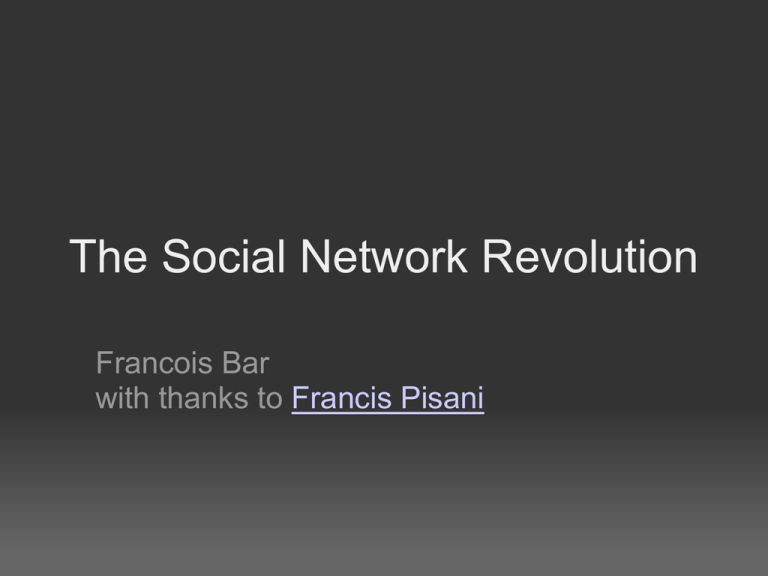
The Social Network Revolution Francois Bar with thanks to Francis Pisani 1. massive growth, a new social web in one year (e.Consultancy): Then: Twitter has 75m user accounts, but only around 15m are active users on a regular basis. Now: Twitter now officially claims to have 175m registered users, although it's unclear what percentage regularly user the service. Then: LinkedIn has over 50m members worldwide. Now: Officially, Linkedin has grown 100%, now having over 100m professionals who use the platform worldwide. Then: Facebook has 350 million active users on global basis. Now: Facebook officially hit the half-billion member mark last year. According to figures from Socialbakers, there are now some 640m Facebook users worldwide. Then: 50% of active users log into Facebook each day. This means at least 175m users every 24 hours. Now: Still citing the 50% active rate, using the official 500m figure, this means at least 250m users every 24 hours. This is more than a 40% increase in 12 months. Then: Flickr hosts more than 4bn images. Now: Flickr continues to grow at a steady rate, having increased by some 25% in the last twelve months. At the end of 2010, it was hosting more than 5bn images. Then: Wikipedia has 14m articles and 85,000 contributors. Now: Wikipedia now has more 17m articles. The site now has an army of 91,000 active contributors. Then: 65m users access Facebook through mobile devices. Now: It may well be the year of mobile... For Facebook. Users accessing the site through mobile devices now tops 200m - an enormous 200% increase in around a twelve-month period. source: RoyalPingdom a new web: from content to connections content / search => users/social networks: not just what you know, but whom you know Google's +1 From divergence to convergence 2. social networks and the arab spring sparks and powder kegs a. new communication ecosystem "The combination of Google, Twitter, Facebook and Al Jazeera in the hands of a new generation of youth armed with cell phones broke social shackles" (Antoní Gutiérrez-Rubí) Feb2011: 5 million Egyptians (out of 80m) have a facebook acct., 77% have a mobile, 21% internet penetration b. spark: Mohamed Buazizi - broadcast by Al Jazeera, retransmitted by social nets c. the spirit of revolution: microblogging has its own narrative capability to transmit emotions + collective awareness 3. limits and dangers a. limited penetration - internet, mobiles, facebook not universal BUT high penetration among urban youth + Al Jazeera audience b. there have been revolutions without ICTs... c. reliability? government shutdowns d. networks effective against hierarchies (Tunisia, Egypt). less against tribes? (Libya, Yemen) e. social networks can also be used against dissidents facebook intel 4. power and social networks overthrowing is different from governing and rebuilding... what type of regime could emerge from struggles led by leaderless network organizations? how can power be taken? the "adrenalin paradox" flickr and tweets egypt tweets by googlerank, in english and arabic Kovas Boguta synthesizing, measuring, etc. Some examples: • • • • • • facebook analytics: insights,etc... twitter tools: grader, tweetstats, retweetrank, wildfire, etc... flickr and twitter maps: major cities crowd-mapping: Ushahidi's Libya crisis map twitter-mining: R-shief crowd-slicing: many eyes on egypt
